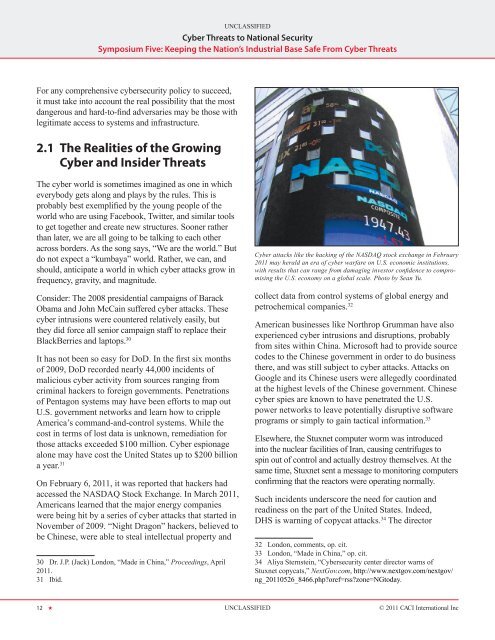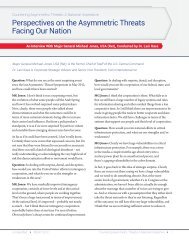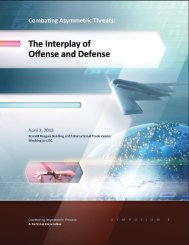Cyber Threats to National Security - The Asymmetric Threat
Cyber Threats to National Security - The Asymmetric Threat
Cyber Threats to National Security - The Asymmetric Threat
Create successful ePaper yourself
Turn your PDF publications into a flip-book with our unique Google optimized e-Paper software.
12 H<br />
<strong>Cyber</strong> <strong><strong>Threat</strong>s</strong> <strong>to</strong> <strong>National</strong> <strong>Security</strong><br />
Symposium Five: Keeping the Nation’s Industrial Base Safe From <strong>Cyber</strong> <strong><strong>Threat</strong>s</strong><br />
For any comprehensive cybersecurity policy <strong>to</strong> succeed,<br />
it must take in<strong>to</strong> account the real possibility that the most<br />
dangerous and hard-<strong>to</strong>-find adversaries may be those with<br />
legitimate access <strong>to</strong> systems and infrastructure.<br />
2.1 <strong>The</strong> Realities of the Growing<br />
<strong>Cyber</strong> and Insider <strong><strong>Threat</strong>s</strong><br />
<strong>The</strong> cyber world is sometimes imagined as one in which<br />
everybody gets along and plays by the rules. This is<br />
probably best exemplified by the young people of the<br />
world who are using Facebook, Twitter, and similar <strong>to</strong>ols<br />
<strong>to</strong> get <strong>to</strong>gether and create new structures. Sooner rather<br />
than later, we are all going <strong>to</strong> be talking <strong>to</strong> each other<br />
across borders. As the song says, “We are the world.” But<br />
do not expect a “kumbaya” world. Rather, we can, and<br />
should, anticipate a world in which cyber attacks grow in<br />
frequency, gravity, and magnitude.<br />
Consider: <strong>The</strong> 2008 presidential campaigns of Barack<br />
Obama and John McCain suffered cyber attacks. <strong>The</strong>se<br />
cyber intrusions were countered relatively easily, but<br />
they did force all senior campaign staff <strong>to</strong> replace their<br />
BlackBerries and lap<strong>to</strong>ps. 30<br />
It has not been so easy for DoD. In the first six months<br />
of 2009, DoD recorded nearly 44,000 incidents of<br />
malicious cyber activity from sources ranging from<br />
criminal hackers <strong>to</strong> foreign governments. Penetrations<br />
of Pentagon systems may have been efforts <strong>to</strong> map out<br />
U.S. government networks and learn how <strong>to</strong> cripple<br />
America’s command-and-control systems. While the<br />
cost in terms of lost data is unknown, remediation for<br />
those attacks exceeded $100 million. <strong>Cyber</strong> espionage<br />
alone may have cost the United States up <strong>to</strong> $200 billion<br />
a year. 31<br />
On February 6, 2011, it was reported that hackers had<br />
accessed the NASDAQ S<strong>to</strong>ck Exchange. In March 2011,<br />
Americans learned that the major energy companies<br />
were being hit by a series of cyber attacks that started in<br />
November of 2009. “Night Dragon” hackers, believed <strong>to</strong><br />
be Chinese, were able <strong>to</strong> steal intellectual property and<br />
30 Dr. J.P. (Jack) London, “Made in China,” Proceedings, April<br />
2011.<br />
31 Ibid.<br />
UNCLASSIFIED<br />
UNCLASSIFIED<br />
<strong>Cyber</strong> attacks like the hacking of the NASDAQ s<strong>to</strong>ck exchange in February<br />
2011 may herald an era of cyber warfare on U.S. economic institutions,<br />
with results that can range from damaging inves<strong>to</strong>r confidence <strong>to</strong> compromising<br />
the U.S. economy on a global scale. Pho<strong>to</strong> by Sean Yu.<br />
collect data from control systems of global energy and<br />
petrochemical companies. 32<br />
American businesses like Northrop Grumman have also<br />
experienced cyber intrusions and disruptions, probably<br />
from sites within China. Microsoft had <strong>to</strong> provide source<br />
codes <strong>to</strong> the Chinese government in order <strong>to</strong> do business<br />
there, and was still subject <strong>to</strong> cyber attacks. Attacks on<br />
Google and its Chinese users were allegedly coordinated<br />
at the highest levels of the Chinese government. Chinese<br />
cyber spies are known <strong>to</strong> have penetrated the U.S.<br />
power networks <strong>to</strong> leave potentially disruptive software<br />
programs or simply <strong>to</strong> gain tactical information. 33<br />
Elsewhere, the Stuxnet computer worm was introduced<br />
in<strong>to</strong> the nuclear facilities of Iran, causing centrifuges <strong>to</strong><br />
spin out of control and actually destroy themselves. At the<br />
same time, Stuxnet sent a message <strong>to</strong> moni<strong>to</strong>ring computers<br />
confirming that the reac<strong>to</strong>rs were operating normally.<br />
Such incidents underscore the need for caution and<br />
readiness on the part of the United States. Indeed,<br />
DHS is warning of copycat attacks. 34 <strong>The</strong> direc<strong>to</strong>r<br />
32 London, comments, op. cit.<br />
33 London, “Made in China,” op. cit.<br />
34 Aliya Sternstein, “<strong>Cyber</strong>security center direc<strong>to</strong>r warns of<br />
Stuxnet copycats,” NextGov.com, http://www.nextgov.com/nextgov/<br />
ng_20110526_8466.php?oref=rss?zone=NG<strong>to</strong>day.<br />
© 2011 CACI International Inc




